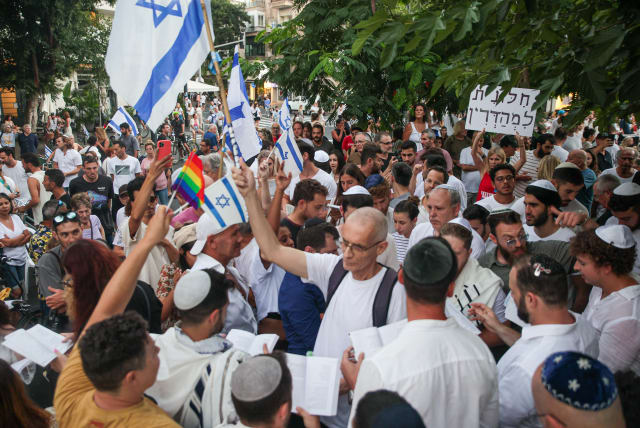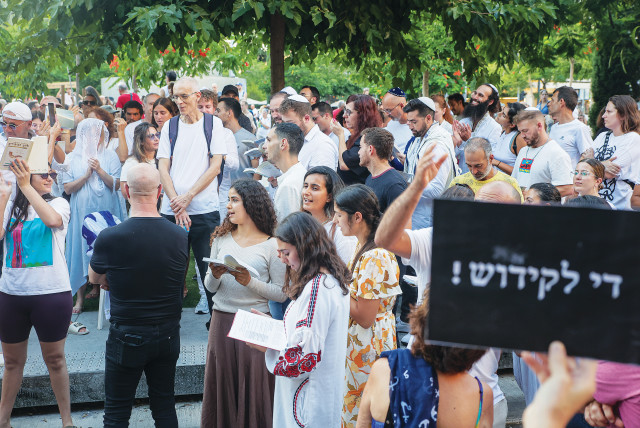Yom Kippur prayers in Tel Aviv can take place with partitions to separate genders, High Court rules

Justices Mintz, Grosskopf, and Kasher issued the High Court ruling, which stated that the Tel Aviv municipality is authorized to make arrangements for the Yom Kippur prayer.
Yom Kippur prayers in Meir Garden in Tel Aviv can take place with partitions to separate men and women, Israel’s High Court of Justice ruled on Wednesday.
The ruling was part of an appeal against the decision that prohibited how the prayer would be held.
Justices Mintz, Grosskopf, and Kasher issued the High Court ruling, which stated that the Tel Aviv municipality is authorized to make arrangements for the Yom Kippur prayer to separate based on gender using partitions at the request of the appellants.
The appellant, the Rosh Yehudi association, welcomed the decision, N12 reported. In their statement quoted by N12, they said, “Tel Aviv is part of the Jewish state, and those who wish to pray separately with a partition will be able to do so...Judaism is stronger than any municipal regulation and more than the unfortunate decision of the Tel Aviv municipality to exclude the traditional public and Judaism itself from the public sphere.”
Previous tensions over separate Yom Kippur prayers in Tel Aviv
Last year, confrontations broke out in Tel Aviv’s Dizengoff Square on Yom Kippur as some congregants tried to set up partitions to separate men and women, which was banned at the time by the Tel Aviv municipality and the High Court because it was a public space.
Some groups petitioned the Tel Aviv courts to overrule the separation ban, but the High Court rejected the petitions.
When the prayer service began, protesters showed up to demonstrate against gender separation, and the disagreements devolved into fighting.
Reactions to the High Court ruling
Tel Aviv’s mayor, Ron Huldai, told residents to respect the High Court’s decision on the matter. In a statement to X/Twitter, he wrote, “The Municipality of Tel Aviv-Jaffa will respect the decision of the High Court and will allow the prayer in Meir Garden on Yom Kippur. I call on the residents of Tel Aviv to respect the verdict.”
עיריית תל אביב-יפו תכבד את החלטת בית המשפט העליון ותאפשר את התפילה בגן מאיר ביום כיפור כלשונה. בית המשפט העליון נתן יד להדרת נשים במרחב הציבורי ובכך פתח מדרון חלקלק. אני קורא לתושבי תל אביב-יפו לכבד את פסק הדין ולאפשר את התפילה בגן מאיר.
— רון חולדאי (@Ron_Huldai) October 9, 2024
However, he criticized the decision, saying, “The High Court gave a hand to the exclusion of women in the public sphere and thus opened a slippery slope.”
Yesh Atid leader Yair Lapid wrote in a statement to X that he would respect the High Court ruling but said, “I call on the liberal public not to give the instigators of the rioters who initiated these prayers the quarrels they want.”
אנחנו נכבד כמובן את פסיקת בית המשפט העליון שאיפשרה תפילות בהפרדה בתל אביב. חוזר וקורא לציבור הליברלי לא לתת למחרחרי המהומות שיזמו את התפילות האלה את המריבה שהם רוצים. לא ללכת להפגין נגד כי זה מה שהם רוצים. עדיף להתעלם. שיישארו שם לבד, תקועים עם עצמם. >>
— יאיר לפיד - Yair Lapid (@yairlapid) October 9, 2024
“Don’t go protest because that’s what they want; it’s better to ignore. Let them stay there alone, stuck with themselves.”
National Security Minister Itamar Ben-Gvir also welcomed the High Court’s ruling, writing on X, “The Court’s decision is the most natural, correct, and appropriate decision. The judges did well to put the Tel Aviv municipality in their places.”
מברך את החלטת בית המשפט לאפשר תפילה בהפרדה במרחב הציבורי, בעיר העברית הראשונה. החלטת העליון היא ההחלטה הטבעית, הנכונה והראויה ביותר. טוב עשו השופטים שהעמידו את עיריית תל-אביב במקום.
— איתמר בן גביר (@itamarbengvir) October 9, 2024
Gideon Sa’ar, who recently joined the government as minister-without-portfolio, wrote to X, “The High Court was right when it overturned the Tel Aviv Municipality’s unfathomable decision to prevent Jews from praying in public according to Israeli tradition on Yom Kippur.”
בית המשפט העליון עשה צדק כשהפך את ההחלטה הבלתי נתפסת של עירית ת״א למנוע תפילת יהודים ברשות הרבים על פי מסורת ישראל ביום הכיפורים. לעמוד על דבר פשוט וחשוב זה במדינה היהודית היחידה בעולם מול שרירות לב של רשות שלטונית הוא לא רק ההחלטה השיפוטית הנכונה. זהו בעיני מעשה של קידוש השם. pic.twitter.com/EzlUTCvqB1
— Gideon Sa'ar | גדעון סער (@gidonsaar) October 9, 2024
Ariella Marsden contributed to this report.
Jerusalem Post Store
`; document.getElementById("linkPremium").innerHTML = cont; var divWithLink = document.getElementById("premium-link"); if (divWithLink !== null && divWithLink !== 'undefined') { divWithLink.style.border = "solid 1px #cb0f3e"; divWithLink.style.textAlign = "center"; divWithLink.style.marginBottom = "15px"; divWithLink.style.marginTop = "15px"; divWithLink.style.width = "100%"; divWithLink.style.backgroundColor = "#122952"; divWithLink.style.color = "#ffffff"; divWithLink.style.lineHeight = "1.5"; } } (function (v, i) { });

